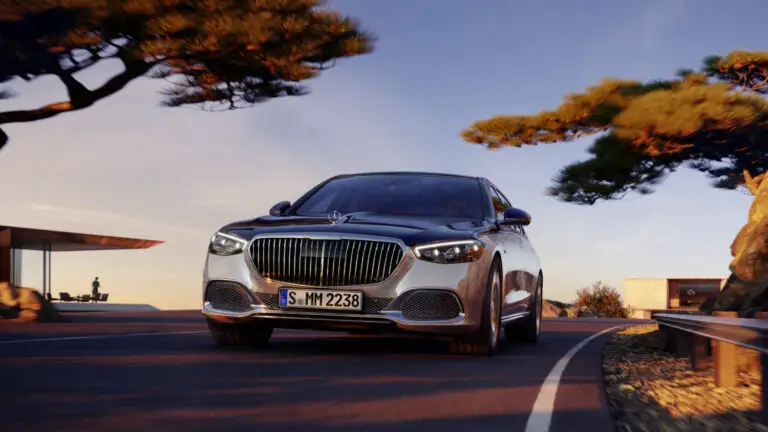In 2021, Mercedes-Benz global sales were down 5% but luxury and electric models, Smart cars, and vans sold well worldwide.

In 2021, Mercedes-Benz delivered 2,093,476 Mercedes-Benz and Smart cars worldwide — 5% fewer global sales than in 2020 but well within expectations given the supply chain problems that affected the automobile industry. Smart brand sales increase slightly while commercial van sales increased by 2.3%. Luxury high-end cars by Maybach, AMG, G, and S-Class sales increased. China remained by far the most important single-country market for Mercedes-Benz followed by the USA and Germany. Mercedes-Benz almost doubled battery-electric car sales worldwide in 2021. Mercedes-Benz expects that the semiconductor supply situation will remain volatile and that the shortage will impact production and sales in 2022.
Mercedes-Benz and Smart Car Sales Worldwide in 2021
Mercedes-Benz and Smart reported car global sales in 2021 as follows:
| 2021 | Change in % | |
| Mercedes-Benz* | 2,054,962 | -5.0 |
| smart | 38,514 | +0.3 |
| Mercedes-Benz Cars | 2,093,476 | -5.0 |
| Mercedes-Benz Vans (commercial models) | 334,210 | +2.6 |
| Mercedes-Benz Cars & Vans | 2,427,686 | -4.0 |
| – thereof BEVs | 99,301 | +90.3 |
*incl. V-Class and EQV
Mercedes-Benz Global Sales by Models in 2021
Demand for Mercedes-Benz vehicles remained high in 2021 even if shortages in especially semiconductors delayed production, especially towards the end of the year. Global deliveries were down by a quarter in the final three months of the year despite reportedly full order books. Waitings times for some models are now over a year.
Although Mercedes-Benz did not publish a full breakdown of worldwide sales by models, it claims that high-end luxury cars including Mercedes-Maybach, Mercedes-AMG, and G-Class vehicles achieved new sales records in 2021.
Deliveries of the Mercedes-Benz S-Class rose by 40% to 87,064 units, with sales in China accounting for 35.5% of global demand while sales of the G-Class surged to a new record of 41,174 vehicles and deliveries of Mercedes-AMG models reached 145,979 (+16.7%). Mercedes-Maybach sales increased to 15,730 units (+50.7%), boosted by China where Mercedes-Maybach cars are selling at a rate of more than 900 a month.
Deliveries of Mercedes-Benz plug-in hybrid and electric passenger cars reached a record 227,458 units (+69.3%) of which 48,936 were Mercedes-EQ battery electric passenger cars (BEV) (+154.8%). Including smart and Mercedes-Benz Vans, total BEV sales rose above 99,000 units.
Since the EQS went on sale in August 2021, orders for the electric flagship reached 16,370. The retail launch in the two largest markets – the United States and China – started in December, providing a further boost to customer orders.
Overall Mercedes-Benz Cars delivered 2,093,476 vehicles (-5.0%) between January and December, as a lack of semiconductors delayed the supply of vehicles despite strong demand for passenger cars and vans in all segments and across all regions. As a result, sales in the fourth quarter decreased by -24.7%.
Mercedes-Benz Passenger Car Sales by Regions in 2021
Mercedes-Benz sales by major global regions and countries in 2021 were as follows:
| Sales 2021 | % Change | |
| Europe | 696,136 | -11.2 |
| – thereof Germany | 213,105 | -25.5 |
| Asia-Pacific | 1,009,763 | -1.6 |
| – thereof China | 758,863 | -2.0 |
| North America | 318,456 | +0.3 |
| -thereof U.S. | 276,102 | +0.4 |
Sales of Mercedes-Benz in the Asia-Pacific region fell to 1,009,763 (-1.6%) between January and December reaching 758,863 units (-2%) in China. In Europe, sales reached 696,136 (-11.2%) of which Germany accounted for 213,105 units (-25.5%) while sales in the North America region totaled 318,456 units (+0.3%) with 276,102 passenger cars delivered to customers in the USA (+0.4%).
Based on internal calculations, Mercedes-Benz is on track to meet its European new car fleet average emissions targets (including European Union, Norway, and Iceland) for the year 2021. For the year 2022 a further decrease in emissions is expected, as sales of plug-in and battery electric vehicles continue to accelerate.
Mercedes-Benz Commercial Van Sales Worldwide in 2021
Sales of commercial vans rose 2.6% in 2021 to 334,210 units, thanks to strong demand in the first half of 2021 and from China and the United States in particular, where sales rose 11.3% and 4.8% respectively. In Europe, Spain emerged as a strong market with deliveries up 23.2% last year. In the US, where especially the Sprinter was again one of the business drivers, 53,472 units (Sprinter and Metris) were sold.
More than 9,000 electric vans were sold for commercial use last year, doubling the number compared to 2020 and further growing the share of electric vehicles in the commercial van fleet. The eVito panel van, launched in December, will convince further customers to drive electrically in 2022 with an additional battery variant and the standard fast charging function.
Global Worldwide Car Sales by Brand in 2021 (Full Year)
Global worldwide sales by brand in 2021:
- Audi
- Bentley
- BMW
- Bugatti
- Caterham
- Cupra
- Daihatsu (see Toyota)
- Ferrari
- Gordon Murray Automotive
- Honda
- Hyundai
- Kia
- Lamborghini
- Lexus (see Toyota)
- Lotus
- Mazda
- Mercedes-Benz
- Mini
- Nissan
- Porsche
- Rolls-Royce
- Seat
- Skoda
- Smart
- Tesla
- Toyota (including Lexus)
- Volkswagen (VW Brand)
- Volkswagen Group
- Volkswagen Group (Battery-Electric Cars)
- Volvo
“Sales” as reported by the various brands generally refer to deliveries and not necessarily sales to the customer or final registration. Terms and definitions may vary.
